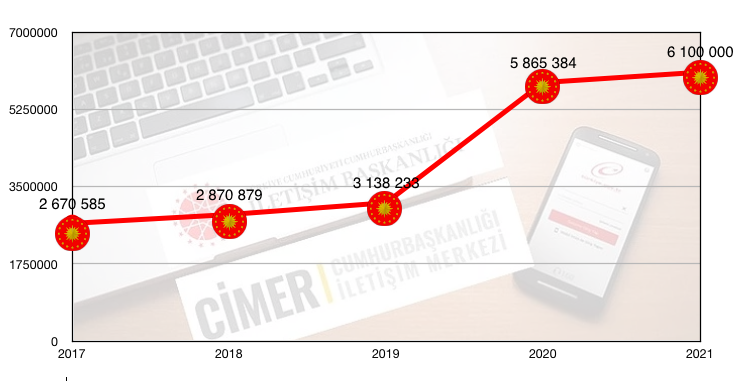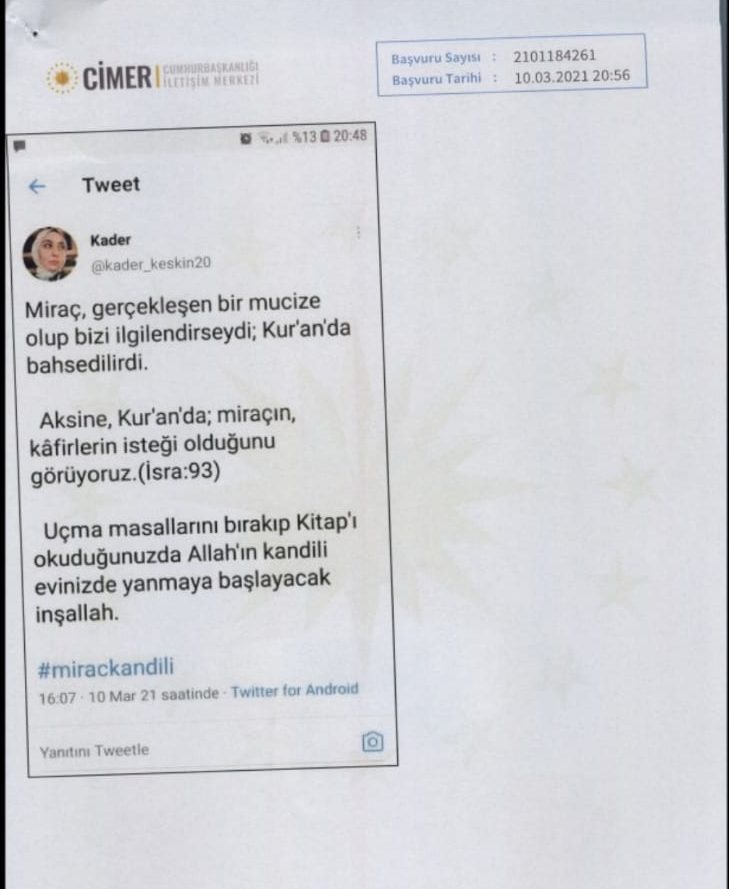Levent Kenez/Stockholm
The Turkish government on Sunday announced the 2021 statistics for the Presidential Communications Center (CİMER), which received 97 percent of total applications online. According to the official figures, 6.1 million people applied to CİMER last year, half of whom reported complaints or denounced others. The public relations center, which the government characterizes as an opportunity for citizens to engage with the administration, has turned into a platform where critics and people whose lifestyles are disapproved of by ruling party supporters are reported. Complaints made to consumer websites show that an important part of the requests made to CİMER involve citizens suffering from economic difficulties.
According to the Presidential Directorate of Communications, which oversees the communications center, CİMER responded to 5.5 million applications out of 6.1 million, a 4 percent increase over the previous year. Forty-five percent of applications submitted to the center were requests, 40 percent were complaints, 8 percent involved the right to information, and 7 percent were acknowledgments, opinions/suggestions. The central organization received 55 percent of the applications, while local administrations received 45 percent. Approximately 600,000 CİMER applications were “thank you” messages. According to the government, CİMER received numerous congratulatory messages following innovations in the defense industry, upon the unveiling of prototypes for a domestically produced electric car, on the opening of Hagia Sophia to worship and for the discovery of natural gas reserves in the Black Sea. However, no data were disclosed regarding requests for financial assistance or their content. The directorate states that only those who want to benefit from the government’s incentives related to COVID have applied in large numbers. Since an application to CİMER is made through a Turkish Republic ID number and a valid e-mail account, it is not very likely that citizens will convey messages criticizing the government given the fear that something will happen to them.
CİMER’s website contains information about what to pay attention to when making a report:
CİMER is known to the Turkish public as a platform where citizens who can’t get results from the authorities apply as a last resort. The increase in applications also points to a decrease in trust in institutions. There is also an impression that more effective results will be obtained if the application is forwarded by the presidency. It also confirms that President Recep Tayyip Erdoğan became the sole decision-maker with the transition to a presidential system in 2018 and that the institutions affiliated with the presidency are becoming stronger.

Applications to CİMER increase every year. According to figures compiled by Nordic Monitor, 3.1 million people applied to it in 2019 and 5.8 million in 2020, compared to only 2.6 million in 2017. The government considers this increase to be a success, seeing it as many more citizens coming into contact with the administration.
One of the phrases that have been included in the Turkish lexicon in recent years is “I will complain about you to CİMER.” This expression, which is frequently used, especially for opponents of the government, did not come into being for no reason.
In a witch-hunt carried out against members of the Gülen movement, a group critical of the president, following a controversial coup attempt in 2016, many people were reported to CİMER as being Gülenists. A significant number of victims claim that that the only evidence against them was the notices made to CİMER.

According to the Turkish media, a general practitioner working in the emergency room of a state hospital in Sakarya about whom many complaints were made to CİMER, was expelled from the civil service in August 2021 on the grounds that he was a member of the Gülen movement.
Not only members of the Gülen community, but also people with a secular lifestyle are reported to CIMER. A complaint was made to CİMER about teacher Nazlı Merve Kılıç’s “behavior unbecoming a teacher” for tweeting pictures of her drinking alcohol last December. Kılıç was summoned to the Istanbul district directorate of the Ministry of Education. Her husband, academic Özgün Emre Koç, confirmed on Twitter that she was called in for an interview because she had been drinking.

In September 2021 a transgender doctor, Larin Kayataş, announced on Twitter that a complaint was filed with CİMER against her by patients who thought she was not suitable to be a doctor and that she had been prohibited from practicing medicine on the grounds of “general morality.”
In March 2021 a complaint was filed with CİMER about Kader Keskin, a student of the faculty of theology at Ondokuz Mayıs University, for her posts about the Islamic faith. An investigation was immediately launched into her by the faculty administration.

CİMER is not a very safe platform for those who submit reports thinking that their identities will remain confidential. The most common complaint of people who made reports to CİMER is the disclosure of their identity information. Particularly, those who denounced members of the Gülen Movement state that their names were included in the indictments. Media outlets close to the government had reported that lawsuits were filed by Gülenists against denouncers living abroad for slander.

Nordic Monitor last week published the correspondence of a computer expert who hacked the Twitter account of a 76-year-old government opponent and sent the account details including the password to CİMER.












